Anterior longitudinal ligament
The anterior longitudinal ligament is a ligament that runs down the anterior surface of the spine. It traverses all of the vertebral bodies and intervertebral discs.
| Anterior longitudinal ligament | |
|---|---|
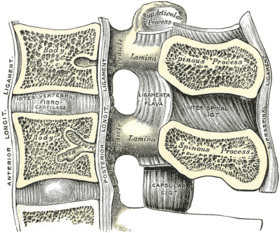 Median sagittal section of two lumbar vertebræ and their ligaments. (Anterior longitudinal ligament runs vertically at center left.) | |
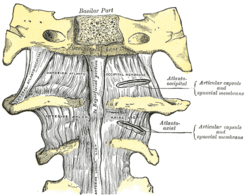 Anterior atlantoöccipital membrane and atlantoaxial ligament. (Anterior longitudinal ligament runs vertically at bottom center.) | |
| Details | |
| From | Inferior Basilar Portion of Occipital Bone |
| To | Sacrum |
| Identifiers | |
| Latin | ligamentum longitudinale anterius |
| TA | A03.2.01.007 |
| FMA | 31893 |
| Anatomical terminology | |
The ligament is thick and slightly more narrow over the vertebral bodies and thinner but slightly wider over the intervertebral discs which is much less pronounced than that seen in the posterior longitudinal ligament. The ligament actually has three layers: superficial, intermediate and deep. The superficial layer traverses 3 – 4 vertebrae, the intermediate layer covers 2 – 3 and the deep layer is only between individual vertebrae.
Additional images
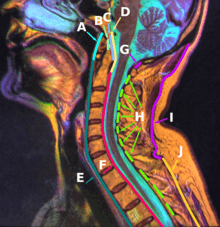 E:Anterior longitudinal ligament
E:Anterior longitudinal ligament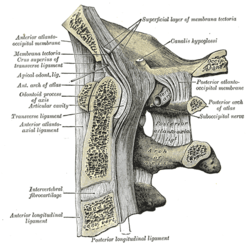 Median sagittal section through the occipital bone and first three cervical vertebræ.
Median sagittal section through the occipital bone and first three cervical vertebræ.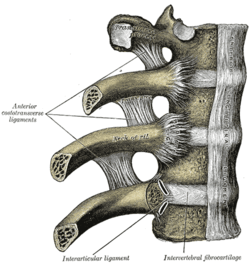 Costovertebral articulations. Anterior view.
Costovertebral articulations. Anterior view.
References
External links
- Atlas image: back_bone25 at the University of Michigan Health System - "Vertebral Column, Dissection, Anterior & Posterior Views"
- lesson7 at The Anatomy Lesson by Wesley Norman (Georgetown University)
- Diagram at spineuniverse.com
This article is issued from Wikipedia. The text is licensed under Creative Commons - Attribution - Sharealike. Additional terms may apply for the media files.